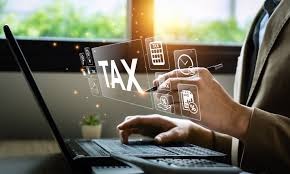Tax season can be stressful, especially when faced with the complex task of filing your tax returns. Choosing the right tax preparation service can significantly reduce this burden, ensuring your taxes are filed accurately and on time. With a variety of options available, ranging from DIY software to professional tax preparers, selecting the best service requires careful consideration of several factors. This article provides a comprehensive guide on how to choose the best tax preparation service tailored to your unique financial situation.
Understanding Tax Preparation ServicesTax preparation services vary widely, from software solutions designed for individuals who prefer a hands-on approach to full-service firms that handle everything for you. Understanding the different types of services available is crucial in making an informed decision.DIY Tax SoftwareDIY tax software is a popular choice for individuals with straightforward tax situations. These programs are designed to be user-friendly, guiding you step-by-step through the tax filing process. Many software options also offer support features, such as live chat or phone support, to assist with any questions that may arise.Professional Tax PreparersProfessional tax preparers include Certified Public Accountants (CPAs), enrolled agents (EAs), and tax attorneys. These experts are well-versed in tax laws and can handle more complex tax situations, such as those involving multiple income sources, business ownership, or significant investments. Hiring a professional tax preparer can provide peace of mind, especially if your tax situation is complicated.Full-Service Tax FirmsFull-service tax firms offer a comprehensive approach, handling everything from filing to audit support. These firms typically employ a team of experts, including CPAs and EAs, to ensure your taxes are prepared accurately. This option is ideal for individuals or businesses with complex tax situations who prefer to leave everything to the professionals.Assessing Your Tax SituationBefore choosing a tax preparation service, it’s important to assess your own tax situation. Understanding the complexity of your taxes will help you determine the level of assistance you need.Simple vs. Complex Tax ReturnsIf your tax situation is simple, with a single income source and no major deductions or credits, a DIY software might be sufficient. However, if you have multiple income streams, investments, or own a business, your tax return is likely more complex, requiring the expertise of a professional.Self-Employed or Business OwnerFor self-employed individuals or business owners, tax preparation can be particularly challenging. There are numerous deductions and credits available, but also more stringent filing requirements. In these cases, a professional tax preparer with experience in business taxes is often the best choice.Special Tax SituationsCertain life events, such as buying a home, getting married, or having a child, can significantly impact your taxes. If you’ve experienced any major changes in the past year, it might be worth consulting a professional to ensure you’re taking full advantage of available tax benefits.Comparing Costs and ValueCost is a significant factor when choosing a tax preparation service. However, it’s important to consider the value provided by the service, not just the price.DIY Software CostsDIY tax software is generally the most affordable option, with many basic versions available for free. More advanced versions, which cater to more complex tax situations, can cost between $50 to $100. Some software providers also offer additional features, such as audit protection, for an extra fee.Professional Preparers’ FeesThe cost of hiring a professional tax preparer can vary widely depending on the complexity of your return and the preparer’s qualifications. On average, you can expect to pay between $200 and $500 for a professional to prepare your taxes. While this is a higher upfront cost, the expertise provided can save you money in the long run, especially if you’re eligible for deductions or credits that you might otherwise overlook.Value Over CostWhen comparing costs, consider the potential savings a professional can bring. A qualified tax preparer can identify deductions and credits you may not be aware of, potentially saving you more than the cost of their fee. Additionally, the peace of mind knowing your taxes are prepared correctly can be invaluable.Evaluating Credentials and ExperienceWhen selecting a tax preparation service, the credentials and experience of the preparer are critical factors. Not all tax preparers are created equal, and it’s important to choose someone who is qualified and trustworthy.Certified Public Accountants (CPAs)CPAs are highly trained professionals who have passed a rigorous exam and meet strict state licensing requirements. They are well-equipped to handle complex tax situations and provide valuable financial advice. If your taxes are complicated, a CPA is often the best choice.Enrolled Agents (EAs)EAs are federally licensed tax practitioners who are authorized to represent taxpayers before the IRS. They specialize in tax law and are required to pass a comprehensive exam or have prior experience working with the IRS. EAs are a good choice for both individuals and businesses looking for expertise in tax matters.Tax AttorneysTax attorneys are lawyers who specialize in tax law. They are particularly useful if you’re dealing with legal issues related to your taxes, such as audits or disputes with the IRS. While tax attorneys are the most expensive option, they provide a high level of expertise in tax law and can represent you in court if necessary.Checking for Red FlagsWhile most tax preparation services are reputable, it’s important to be aware of potential red flags that could indicate a less-than-reputable provider.Promises of Large RefundsBe cautious of tax preparers who promise large refunds without reviewing your financial information. Legitimate tax professionals will not guarantee a refund amount without thoroughly understanding your tax situation.Lack of TransparencyA reputable tax preparer should be transparent about their fees and the services they provide. If a preparer is vague about costs or unwilling to provide a clear estimate, it’s a good idea to look elsewhere.No PTINThe IRS requires all paid tax preparers to have a Preparer Tax Identification Number (PTIN). If a tax preparer does not have a PTIN or is unwilling to provide it, this is a significant red flag.Considering Convenience and AccessibilityConvenience is another important factor when choosing a tax preparation service. The ease of accessing the service and communicating with the preparer can impact your overall experience.In-Person vs. Online ServicesIn-person tax preparation services offer the advantage of face-to-face communication, which can be helpful for discussing complex tax issues. However, online services can be more convenient, especially if you have a busy schedule. Many online services offer virtual consultations, allowing you to communicate with a preparer from the comfort of your home.Availability and SupportConsider the availability of the tax preparer or service. Will they be available to answer questions throughout the year, or only during tax season? It’s also important to know what kind of support is available if you need help after your return is filed.Understanding the Filing ProcessUnderstanding the filing process of your chosen tax preparation service is essential for ensuring everything goes smoothly.Document SubmissionFind out how the service collects and handles your financial documents. Some services allow you to upload documents securely online, while others may require in-person drop-offs. Understanding this process can help you prepare and organize your documents ahead of time.Filing MethodsDetermine whether the service will file your taxes electronically or via paper. Electronic filing is faster and more secure, leading to quicker refunds. Most tax preparation services offer e-filing as a standard option.Audit SupportCheck if the tax preparation service offers audit support. While audits are relatively rare, it’s important to know that your preparer will assist you if the IRS questions your return. Some services include audit support in their fees, while others may charge extra.Reading Reviews and TestimonialsCustomer reviews and testimonials can provide valuable insight into the quality of a tax preparation service. Take the time to read reviews on multiple platforms to get a well-rounded view of the service.Online ReviewsLook for reviews on websites like Google, Yelp, or the Better Business Bureau. Pay attention to both positive and negative reviews to understand the strengths and weaknesses of the service.Word of MouthAsk friends, family, or colleagues for recommendations. Personal experiences can often provide the most reliable information about a tax preparation service’s quality and reliability.Professional AssociationsCheck if the tax preparer is a member of professional organizations, such as the National Association of Tax Professionals (NATP) or the American Institute of CPAs (AICPA). Membership in these organizations can be an indicator of a preparer’s commitment to their profession and adherence to ethical standards.Ensuring Data SecurityData security is paramount when dealing with sensitive financial information. When choosing a tax preparation service, it’s essential to ensure that your data will be handled securely.Secure Document TransferEnsure that the service uses secure methods for document transfer, such as encrypted email or secure online portals. Avoid services that request sensitive information via unsecured methods, such as regular email.Data Retention PoliciesFind out how long the service will retain your tax documents and what their policy is for data deletion. It’s important to ensure that your data will not be stored longer than necessary, reducing the risk of unauthorized access.IRS Regulations ComplianceMake sure the service complies with IRS regulations regarding the protection of taxpayer data. This includes proper handling, storage, and transmission of sensitive information.Making the Final DecisionAfter considering all these factors, you should have a clear idea of the type of tax preparation service that best suits your needs. However, making the final decision requires balancing these considerations to find the best fit.Weighing Pros and ConsList the pros and cons of each option you’re considering. This can help clarify which service offers the best balance of cost, convenience, expertise, and security for your situation.Trusting Your InstinctsUltimately, it’s important to trust your instincts. If a service seems too good to be true, or if you feel uncomfortable with a preparer, it’s best to look elsewhere. Choose a service that you feel confident will handle your taxes with care and professionalism.Preparing for the FutureRemember that your tax situation can change over time. It’s worth considering a service that can grow with you, offering more complex services as your financial situation evolves.FAQsWhat is the difference between a CPA and an EA?A CPA (Certified Public Accountant) is a licensed professional who provides a wide range of accounting services, including tax preparation. An EA (Enrolled Agent) is a tax specialist licensed by the IRS, focusing exclusively on tax-related services.Is it safe to use online tax preparation services?Yes, reputable online tax preparation services are safe as long as they use secure methods for handling your data, such as encryption and secure servers. Always ensure the service complies with IRS regulations regarding data security.How much should I expect to pay for professional tax preparation?The cost can vary depending on the complexity of your tax return and the preparer’s qualifications. On average, professional tax preparation fees range from $200 to $500, though complex returns can cost more.Can I switch tax preparers if I’m not satisfied with the service?Yes, you can switch tax preparers at any time, even during the tax filing process. If you’re not satisfied with the service, it’s important to address your concerns and consider finding a preparer who better meets your needs.What documents do I need to provide to a tax preparer?You will need to provide various documents, including your W-2s, 1099s, records of any deductions or credits, and any other relevant financial information. Your tax preparer should provide a checklist of required documents.How do I know if my tax preparer is reputable?To ensure your tax preparer is reputable, check their credentials, read reviews, and verify that they have a PTIN (Preparer Tax Identification Number). Membership in professional organizations, such as the AICPA, can also be a good indicator of reliability.ConclusionChoosing the best tax preparation service is a crucial decision that can impact your financial health. By understanding your tax situation, comparing costs, evaluating credentials, and considering convenience and security, you can select a service that meets your needs and provides peace of mind. Whether you opt for DIY software, a professional preparer, or a full-service firm, the right choice will help ensure that your taxes are prepared accurately and efficiently.





